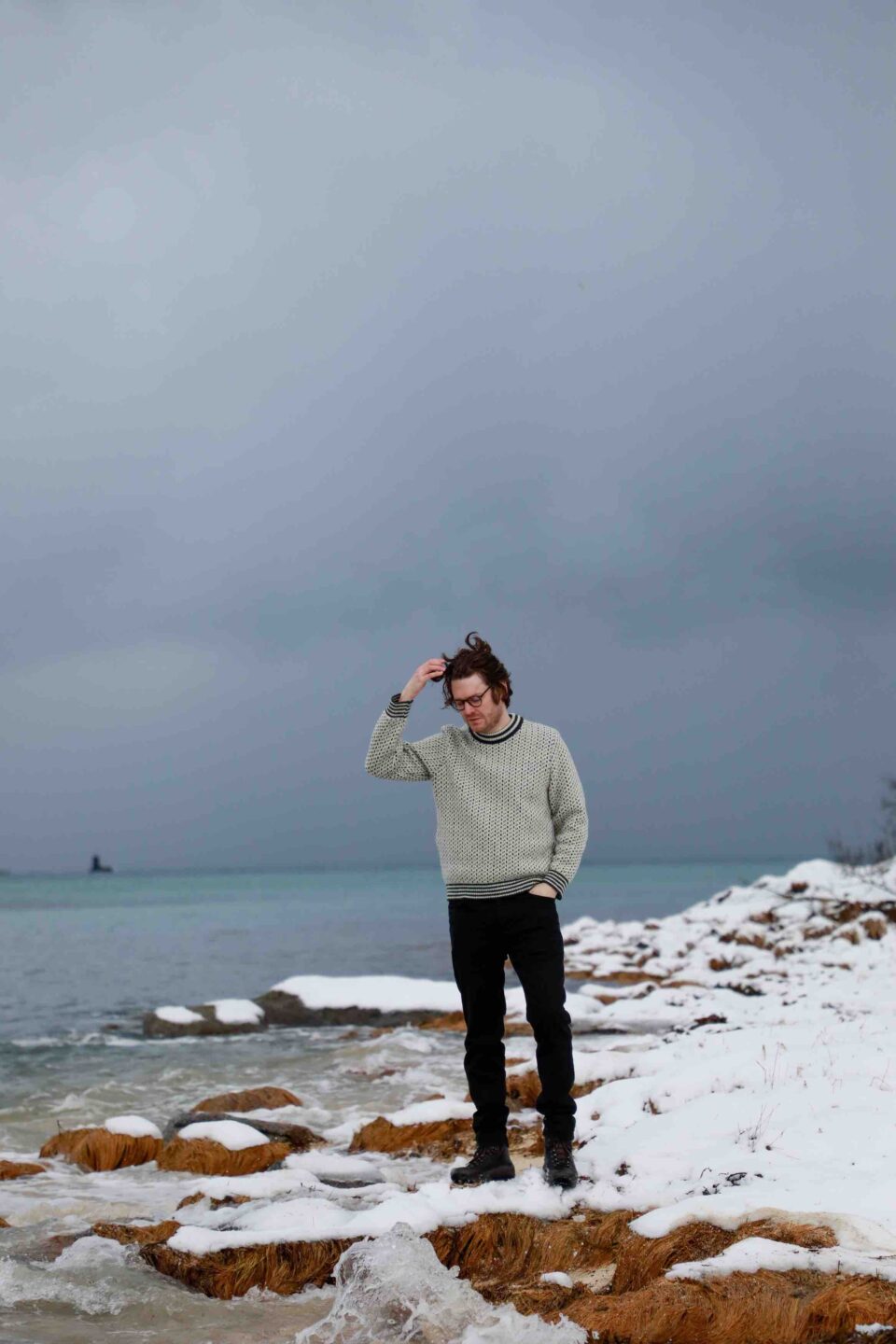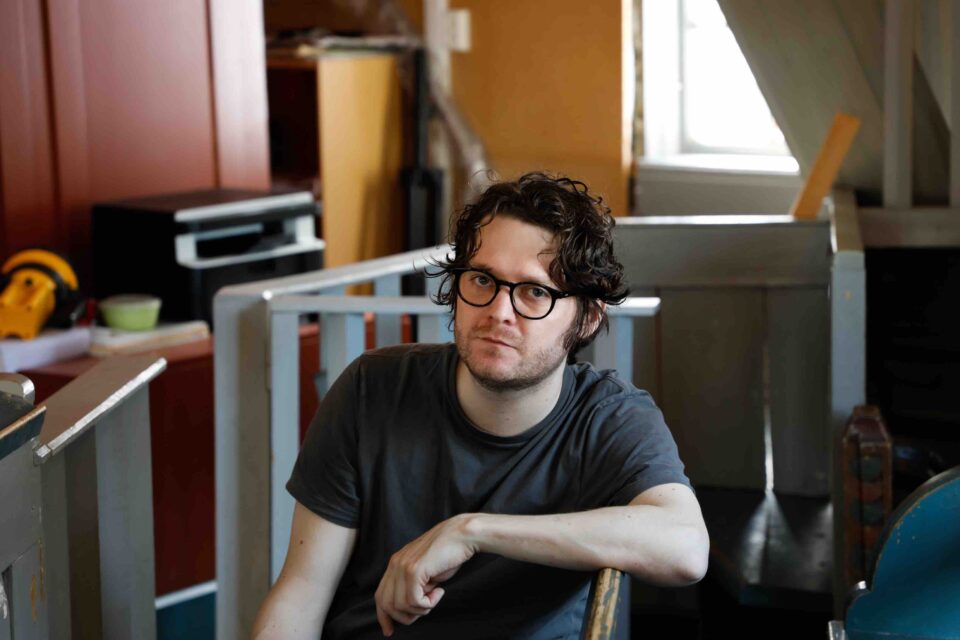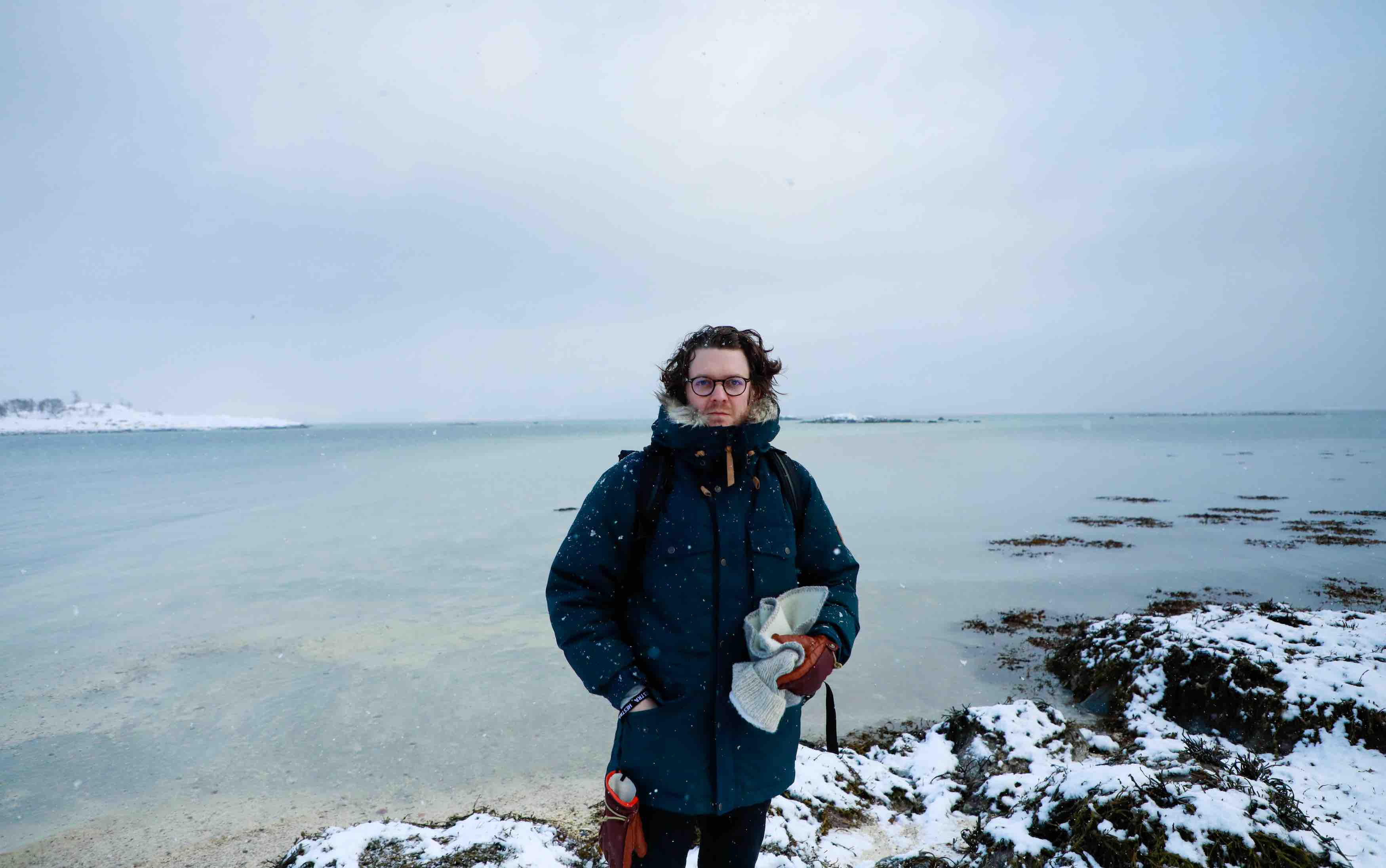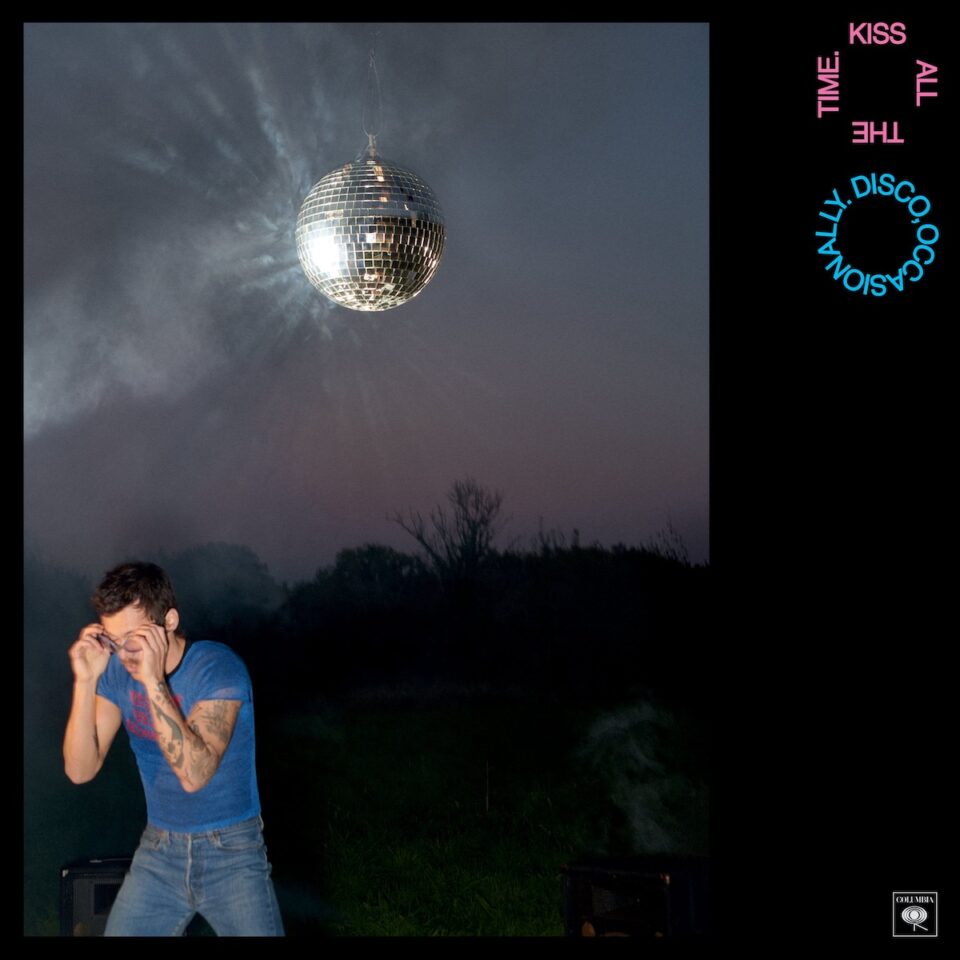The story of the new Beirut album, Hadsel, is one that began during what was perhaps the lowest moment of Zach Condon’s life. The musician, who began releasing albums under the Beirut moniker almost two decades ago, retreated from his public music career in 2019 after canceling a tour in support of his album Gallipoli, citing acute laryngitis. The much-needed break from the road allowed Condon to diagnose the various mental and physical strains such a life caused, and he realized his issues were much more serious than even he was willing to admit. “The language I used for many years was ’nervous breakdown,’ or a blend of panic and anxiety issues,” he tells me from his home studio in Berlin. “But the truth is, when I look back on it, it was much more psychedelic than that. I split off from reality for a long time.”
During the time between Gallipoli and Hadsel, Condon would go days without knowing who he was, wandering the streets in slippers before realizing he’d even left the house. Condon, by his own estimation, had a psychotic break, and Hadsel is an album about coming to terms with this realization. With the time off, and after spending time in the Norwegian municipality that lends the new record its name, Condon has begun to mitigate many of the symptoms that were detrimental to his life and career. Hadsel is less of a return to form than a new era for Beirut entirely, the story of a man who had no idea that a journey of self-discovery would be so intense and so challenging. Condon has emerged on the other side, stronger than before, while still readily acknowledging that the fight never lets up.
We discuss his journey in the conversation below.
When you called off your tour in 2019, did you imagine that you’d be able to make another record or tour again?
I knew I’d be making records again—I was making records long before there was even an audience, so that was never a question. But with touring, I’ve actually come to the conclusion that no, I shouldn’t. At the time, I felt that way but was afraid to say it. It’s been 17 years of trying and failing. Not even failing, just falling apart. I don’t think I can do that to myself anymore.
What was it about touring for that long that was so wearying?
I think my brain can’t take that kind of stimuli and pressure and lack of sleep and all these things that come up, and it’s always been that way. The only difference was that after that first tour, they put me on a hell of a lot of medicine. They put me on all sorts of heavy anti-anxiety medications, and that brought me back to Earth enough to keep moving. But this is a Band-Aid for a much bigger problem. In 2019, I was fresh off of all that stuff. I’d stopped drinking as well, and it was like, “Oh yeah, this is why I drank, I see it now.”
“I had this really frail grasp on the universe. I used to think that if I just blinked the wrong way I would disappear out of existence.”
Outside of drinking, what sort of steps did you take to get to a place where you recognized yourself again?
I started writing music again, which is incredible because it would take me 15 minutes to wake up and remind myself of who I was. I had this really frail grasp on the universe. I used to think that if I just blinked the wrong way I would disappear out of existence. It was this horrible thing that I carried around with me, but before long I was back on the keyboards. A lot of it had to do with the medication I was on. You can see it in old photos of me, my eyes are just fading off into two different directions.

Some of the new record builds off you disappearing from the spotlight and then reemerging in a healthier place. Was it hard to reckon with the fact that you’d have to be talking so openly about where you’d been?
I did have to prepare myself. That’s the funny thing: The narrative is like I had this dark night of the soul, I went up there and I got better and I came back. That would be nice, but it’s too tidy. It’s much more like I went there and I got even further into my own head than I should’ve, and I came back, and then COVID hit, and then I was isolated and stuck in my head and it got even worse.
Over the last four years I tried to take charge of the situation. I remember thinking when I began this record, “I’ve had these issues with paranoia and delusions and anxiety and depression since I was a little kid, but I’m going to figure it out and it’s going to get better.” I thought it would be like, “Here’s the diagnosis, here’s the treatment, and here’s the result.” That’s not how it works with these kinds of issues. I carry them better [now], and I’m much better at recognizing quickly that I’m going into an obsessive spiral.
“Life is serious and life is a struggle. We’re not just meant to breeze through it. It’s fucking tough. There’s a beauty to that, too.”
This is an everyday activity where you’re constantly getting better.
That’s the real frustration of it. That’s the exhaustion and burnout you get. Even just cycling back into my old habits again: “Oh, I haven’t left the house in a week.”
This is sort of two steps forward, one step back, and that step back feels so frustrating.
The funny thing is talking about it, it sounds like you have some knowledge of this. I realized, “Wow, everybody has this. Holy shit. That’s life.” It’s made me realize that therapy and medication are no match for this kind of nemesis. What I’ve had to do is scrap a lot of that stuff, even though I think it’s incredibly useful. I’ve actually gone into a more philosophical route of being like, “This is what people have battled with ever since we’ve had consciousness. This was the fucking trade-off, basically, for existing.” Life is serious and life is a struggle. We’re not just meant to breeze through it. It’s fucking tough. There’s a beauty to that, too.
How did you find Hadsel?
I’ve always wanted to go to an extremely wintery place. Fall might be my favorite season, but I love winter. I love the anticipation, the snow, the darkness—it just works for me. I was shown Lofoten, which is more well-known, and I really fell in love with the pictures of it. But I knew that it had a tourist problem as well. I decided to look nearby, and that was how I stumbled on that island in particular. This whole thing wouldn’t exist if it wasn’t for my partner who speaks fluent Swedish. She’d been looking at Norway for a long time because of a trip she’d taken there once before.
Where did you write the majority of the record? Was it in Berlin?
It was about 50/50. I actually wrote so much material in Hadsel, but I came home with this feeling of, “What am I going to do with this mess?” I wasn’t like, “This is an album and it’s about this island.” I was just there doodling. I came back with a hodgepodge mess that I couldn’t make sense of. I really spent a good six months to a year back in Berlin just kind of building up this studio that I’m in now and making the album make sense. I got a modular synthesizer, which was so good to help me zone out.
“I wasn’t like, ‘This is an album and it’s about this island.’ I was just there doodling. I came back with a hodgepodge mess that I couldn’t make sense of.”
Was it an intentional decision to record this whole album by yourself?
One of the biggest hardships for me about the touring thing was that I had all these people relying on me—I was the central figure of this little ecosystem. As I got the sniffles, oh no, I had to send 15 people home empty-handed. I didn’t want to do that anymore. I just wanted to be on my own. I used to do this completely on my own with no one watching, no one chipping in. It’s hard because you have no one else when you get stuck. You don’t have anyone else to lean on and offer a second set of ears.
Having that self-awareness about people relying on you is important, though.
I’m not the most reliable guy, to be honest. I’m not saying it’s out of any meanness or anything like that. I think that’s actually one of my issues, literally, with my brain: The way I’m wired is not a stable foundation, unfortunately. I can get nebulous and I can disappear. We had six months in Berlin where there were sticky notes all over the house and it was my attempt at organizing things. We would get back from these trips and I would be so out of it. There’s so many stories of me walking across Hadsel in my house slippers. Going around the house, I would pour myself some cereal in the morning, and then apparently I would put the cereal box in the fridge, the empty bowl in the cupboard, and pour the milk down the drain and then walk away.

You don’t recall these experiences?
That’s the thing people don’t quite get. I always used coded language, being like, “I had exhaustion after the tour.” It’s like, no, no, no. I had breaks. I had breaks from reality. It was not pretty. It was very, very hard to deal with sitting with my parents, talking about, “Am I going to be able to leave the house on my own again, or is my future a kind of chaperoned life?” I’m really glad that I’ve been able to get out of it, but damn, it really sneaks up on me sometimes, and I’ll have months where it feels like I’m gone.
What’s the summer like in Hadsel?
Summer is a trip because in the winter you’re in the Arctic. It’s not as cold as people think, because there’s a lot of Gulf Stream warmth that goes all the way up Norway, but you definitely see it and the light is so different. In the summer, once you cross the mountains from Sweden and go into the valley, it feels like you’re entering some lost land because it looks like a jungle. It’s so green, it’s so vibrant, and it’s so intense. There are these big flowers that make you ask, “How the hell can this be all the way up here in the north?” The biome is unlike anything else because it’s a mixture of heavy, heavy rain and arctic light. It’s very surreal. FL







